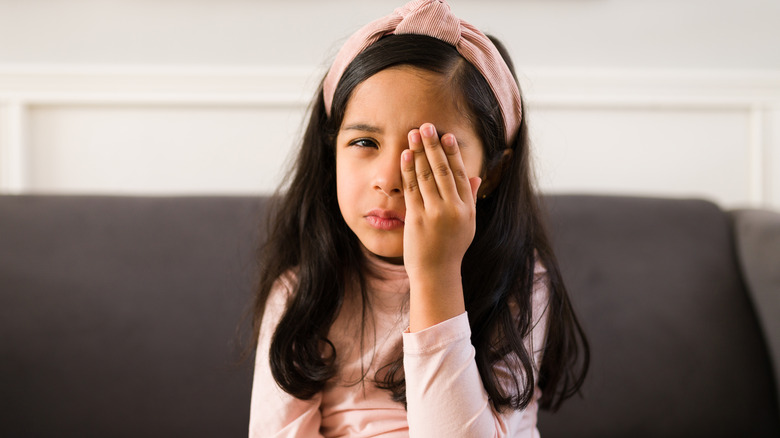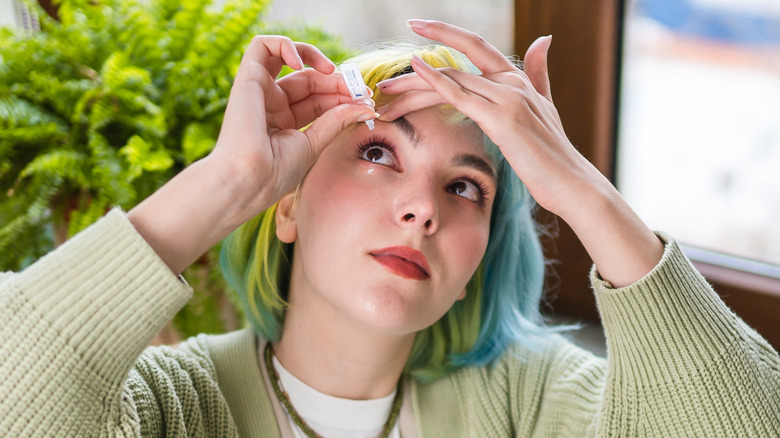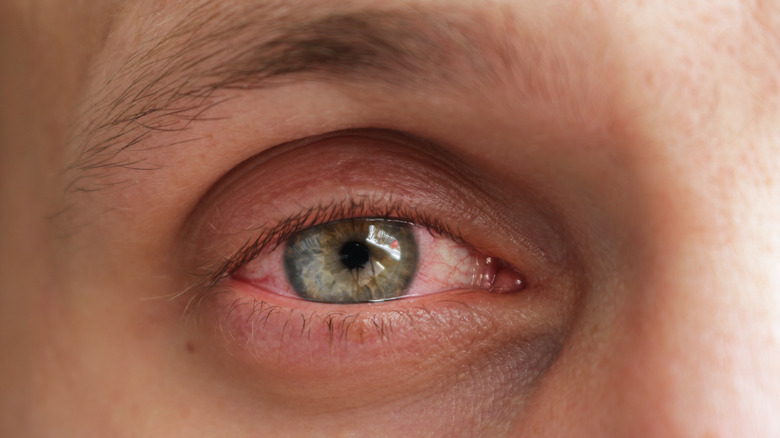Can Pink Eye Heal On Its Own?
Not all cases of pink eye can be traced to one singular cause. Air pollution, chemical exposure, contact lens wear, or getting a grain of sand stuck in one's eye can all prompt the development of pink eye, according to the U.S. Centers for Disease Control and Prevention (CDC). Most often, however, conjunctivitis is the product of viral or bacterial contamination. Unfortunately, it's these cases that can spread readily from one person to the next.
Generally speaking, those with pink eye may experience itching, irritation, swelling, redness, discharge, or crusting within the eye, amongst other symptoms. Able to be transmitted through direct contact, contaminated surfaces, or by cough and sneeze particles, cases of pink eye are often seen amongst children.
Conjunctivitis infections can range from mild to severe and may therefore require different treatment approaches depending on the cause. But is a trip to the doctor always necessary? Rather, is it possible that pink eye can resolve itself if we simply give it enough time to heal?
How long does pink eye take to heal?
Generally speaking, pink eye can remedy itself on its own. However, depending on the cause, a patient's recovery time can vary. For example, more mild cases of viral conjunctivitis often heal within one to two weeks' time without any treatment, although some cases may take longer (via CDC). For those with a bacterial infection of conjunctivitis, symptoms often begin to subside on their own within two to five days, but may not clear up entirely for about two weeks.
As the virus naturally works its way out of the body, there are at-home remedies one can implement to help ease the discomfort during the healing process. This includes placing a warm or cool compress over the eye, rinsing the rim of the eyelid with warm water, or applying over-the-counter (OTC) eye drops into the affected eye (via ABC Children's Eye Specialists). In addition to letting the infection heal on its own, one should also try to minimize the chances for spreading within the household. Be sure to practice regular hand hygiene, avoid touching the eyes, and refrain from sharing personal items with others, such as towels, eye makeup, or pillowcases.
When to see your doctor for pink eye
Although a mild conjunctivitis infection can clear up on its own, there are instances in which it is advised to seek medical treatment. Some pink eye infections can cause damage to the cornea and pose a risk to one's sight, such as those related to chlamydia, gonorrhea, or specific adenovirus strains (via WebMD). Speak to your physician if you experience any accompanying symptoms such as pain in the eye, light sensitivity, blurry vision, or excessive redness. You should also seek medical treatment if symptoms continue to linger or worsen. This is especially true for bacterial cases of conjunctivitis that have not improved after a full day of antibiotic use. Those with compromised immunity should also see their doctor. Seek prompt medical care for newborns with cases of pink eye.
Once fully healed, it's important to take steps to ensure the infection doesn't return by disposing of all items that may have potentially been contaminated. This includes makeup and brushes, as well as disposable contact lens wear and cleaning solution. Additionally, thoroughly clean any eyeglasses or extended-wear contact lenses worn while sick, and be sure to wash and change all bedding.



